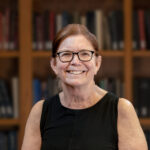
I grew up in a suburb of Philadelphia. It was the ‘50s, when kids played outside much of the time and knew the day was over and it was time to head home when the local fire house five o’clock whistle blew.
My family was a member of the budding Catholic community in our town. We didn’t have a church to attend Mass in, so we borrowed a neighboring town’s until we finally had our own. Our friends and their families for the most part attended a local Presbyterian Church. I would go there in the summer for Bible study school; it was the thing you did when school was out.
I can’t really recall when I embraced my religion; it seems like it was always there. My parents both had members of religious orders among their extended families so being around religion seemed second nature to me. Our parish pastor built a school before a church and for eight years I went to grammar school studying math, English, geography, science, and religion every day.
Somewhere among those years of growing up I acquired a sense of religious tolerance. This wasn’t something I was especially aware of, but I do appreciate now that it is present in how I think about and act upon various situations. Maybe it started back in those Bible study classes of my youth.
In 1970 I moved to a small rural town outside of Hartford, Connecticut. I was a young mom with two small children. It was in this town that I experienced the impact of churches working together. I found myself once again a member of a newly-formed Catholic community without a church. We joked that we worshipped under the basketball hoops, which was true, since we were attending regular weekly Mass in the gym of a local school.
Our faith community was asked to join with the town’s five other faith communities in taking responsibility for a federal program that distributed milk and cheese monthly to those in our town who needed some extra help. It didn’t take long for us to realize people needed more than just milk and cheese. Coming together we formed a local food bank that was supplied by the generous contributions from each of our communities.
Each faith community viewed management of the food bank as a collective responsibility which brought us together monthly to review the impact of what we were doing and to discuss new areas needing support. The dialogue in these meetings led us to an appreciation of each other and to look for ways to deepen our newly formed relationships. Especially meaningful were those times where we came together to pray. Looking back at it now, I think we had reached such a level of trust among each other it seemed only natural on Thanksgiving and other times during the year to give thanks through prayer. What I did not appreciate then about this relationship was its uniqueness.
In the aftermath of September 11th I came to see again the power of interfaith collaboration. I was living in New York City working for a management consulting firm. In the aftermath of that terrible day my firm joined with others to help create the Family Justice Center, a place where families of those who lost loved ones could come for information and support. Among the services offered was clergy support and counseling. Faith community leaders from all around the city were there day after day offering families spiritual support. It didn’t matter what your faith tradition or if you were of little or no faith; members of the clergy treated whoever was in front of them with such respect and loving care and concern.
I have traveled a lot since those days in Connecticut and New York and am always looking in the churches I attend to see if that interfaith spirit is present. Once you have had the good fortune of experiencing interfaith collaboration it’s hard to be without it.
When I learned of ICJS’s Congregational Leaders Fellowship opportunity for my faith community, I was pleasantly surprised that there was a group actively working to plant the seeds of interfaith understanding. Over the last eight months of participating in the fellowship program, I have come to appreciate an aspect of interfaith collaboration that I had not considered. It takes a healthy level of trust to make this work. Trust that comes from being able to listen to each other’s stories and appreciate how past experiences contribute to the protective walls present in each of us. Opening up to each other in the security of a safe space with a kind and patient listener offers us the opportunity to heal wounds and move forward together.
 Jane Ambrose is a member of St. Ignatius Catholic Community and was a member of the 2022 ICJS Congregational Leaders Fellowship. Learn more about the ICJS Congregational Leaders programs here.
Jane Ambrose is a member of St. Ignatius Catholic Community and was a member of the 2022 ICJS Congregational Leaders Fellowship. Learn more about the ICJS Congregational Leaders programs here.
Opinions expressed in blog posts by the ICJS Congregational Leader Fellows are solely the author’s. ICJS welcomes a diversity of opinions and perspectives.